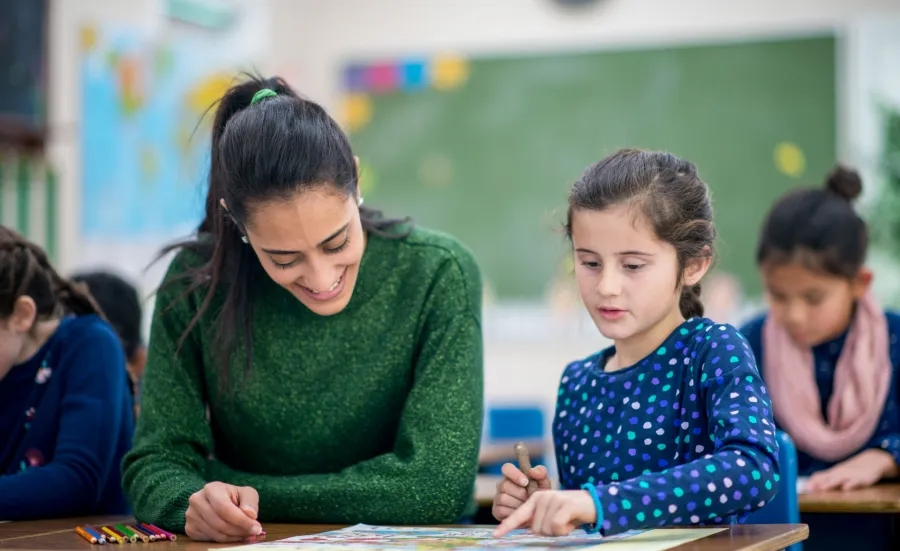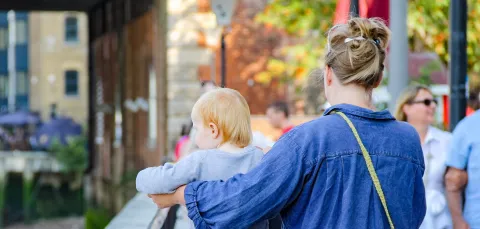The Widening Participation and Social Mobility (WPSM) team run three programmes – Books and Stories, Shapes and Numbers, and Reading Buddies – which help primary and secondary school pupils in the city who face challenges with numeracy and literacy.
Books and Stories and Shapes and Numbers support primary school pupils with literacy and numeracy respectively through bespoke workbooks and reading with partners. Reading Buddies gives pupils in secondary schools the chance to further improve their reading skills as they approach major educational milestones.
During these focused 10-week programmes the teams work with over 120 primary school pupils and over 100 secondary school pupils – and this number is expected to grow as the demand for these programmes increases.
Locally focused support
Trained student ambassadors and experienced educators from the University visit local schools to deliver these sessions in small groups, ensuring that pupils experience focused, near-to-peer support with literacy and numeracy.
While schemes like this are in place nationwide, these Southampton programmes have local young people at the heart of them. Reading Buddies was developed in collaboration with Cantell School, catering to the specific needs of the young people in the city. Shapes and Numbers also enables pupils to enjoy custom-made workbooks that draw on research and academic work taking place here at the University – for example, using archaeology to teach maths.
The community focus of this work goes beyond the classroom, too. The WPSM team is collaborating with local independent bookshop October Books to supply reading material for the schools and pupils involved, supporting the local economy and small businesses.
Chantelle Veneroso, Widening Participation Coordinator, supports the delivery of the programmes.
We only deliver this scheme in Southampton schools, so it is very local to our students. We’re particularly focused on primary schools, to help their transition into secondary and lifelong learning after that. Maths and English are key skills; not just for getting into university, but for the next stages of life. If we can decrease the gap sooner, it will help in the long term.
Chantelle Veneroso, Widening Participation Coordinator
Breaking down barriers
All three programmes are targeted to support those from disadvantaged backgrounds, including pupils who qualify for free school meals, or those with a lower-than-expected reading age, and the schools that benefit are selected based on socioeconomic data and assessment.
Activities like these directly respond to a nationwide need for extra education support and an ever-expanding attainment gap, which is wider in Southampton than in many parts of the UK. Closing this attainment gap is key to equality in education and will have a lasting impact on pupils’ lives, helping children and young people to reach their potential, whatever their background or lived experience.
Liam Gifford, Widening Participation Project Leader, works with Chantelle to help deliver the programmes.
We're really making sure that these sessions are being delivered to those people who would benefit the most. We try to ensure that we're giving equitable opportunities to children and young people as much as possible. We’re saying to these young, disadvantaged people that they matter.
Liam Gifford, Widening Participation Project Leader
These programmes are also a chance for the WPSM team to share information about financial and access support offered by the University, such as bursaries and grants, which are critical for ensuring education is open to all. Their hope is that young people who may not have considered higher education a possibility for them will feel inspired and encouraged.
“The work that we do in WPSM is all about ensuring that everyone feels welcomed into the University community, and like it's something that they can do, even if they won't necessarily come to Southampton,” Liam explains.
Celebrating achievements on campus
In June 2024, these programmes culminated in two big celebration events – or graduations – hosted at Turner Sims concert hall on Highfield Campus. Hundreds of pupils who completed the programmes, along with their guests, were recognised for their work and enjoyed prizes, certificates, entertainment and inspiring speeches.
Beyond marking the end of the programme, these events also recognised the pupils’ hard work, offered further motivation, and re-emphasised that University education is open to everyone.
“These students have committed to this programme, and they work really hard. This is a chance for them to celebrate with us, and to celebrate themselves and their hard work,” says Chantelle. “It’s an amazing event, and an opportunity to bring those students onto campus, solidifying the message that university is for everybody.”
Bringing people together into a safe space, and a space which historically may not have been for them, is why these celebration events are so important. There’s nothing better than being around young people to remind you why you do this work.
Liam Gifford, Widening Participation Project Leader



